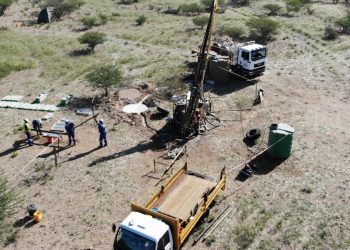
An audit of Namibia’s mining sector has confirmed that three of the country’s major gold mines , QKR Namibia Navachab Gold Mine, B2Gold Namibia, and Osino Resources, are compliant with the local ownership requirements set out in the Minerals (Prospecting and Mining) Act of 1992.
The audit, conducted by the Office of the Auditor General, specifically reviewed compliance with Section 47(2)(a) of the Act, which requires that Namibians retain at least a 15% interest in any mineral licence that is transferred, ceded, or assigned.
“The audit found that there were no transfer of licences for the three gold mines, and consequently, no instances of non-compliance with Section 47(2)(a) were observed,” the Auditor General reported.
The Executive Director of the Ministry of Mines and Energy was commended for ensuring proper oversight of this provision.
In response to the findings, the Ministry stressed that the 15% Namibian ownership requirement is strictly enforced whenever licence transfer applications involving foreign entities are submitted.
The Ministry explained that this mechanism is designed to protect Namibian participation in the mining sector and to secure long-term economic benefits for the country.
The audit, however, flagged several areas of non-compliance with other obligations under the Minerals Act.
It found that QKR Namibia Navachab Gold Mine and B2Gold Namibia had not implemented or reported on the mandatory training of Namibian employees, as required by Section 50(c) of the Act.
Both companies were found to have failed to provide sufficient evidence of collaborating with other stakeholders to support skills transfer and the development of mining-related technologies, which is required under Section 50(e).
Further issues were noted regarding company reporting obligations.
According to the audit, several changes — including company names, addresses, directors, share capital, and beneficial ownership linked to Exclusive Prospecting Licences (EPLs) 999, 2410, 3739, 4309, and 5658 — were not reported to the Commissioner within the legally required 30-day period under Section 50(h).
“The applicant might not comply with all the general terms and conditions of mineral licences, which would result in Namibians not being capacitated in the mining industry,” the report warned.
In addition, the audit revealed that some mining companies operated on private land without submitting the required compensation agreements or waivers to the Commissioner, as outlined under Section 52(1) of the Act. Although the companies claimed to own the land where mining activities are taking place, they did not provide title deeds to prove ownership.
This failure to submit the necessary documents, the audit noted, weakens state oversight and could result in monopolistic land control, reducing competition and potentially discouraging investment.
The Auditor General recommended that companies be required to submit title deeds and that this obligation be incorporated into the forthcoming Mining Bill. In its response, the Ministry said it is currently in the process of collecting the necessary land ownership documents.
“In their response letter, dated 26 April 2024, the Ministry stated that the gold mining companies also own the land where mining activities are conducted. However, the Ministry did not provide evidence to support these ownership claims such as title deeds,” the report stated.
The audit also highlighted irregularities regarding the renewal of Exclusive Prospecting Licences (EPLs). It found that six out of 13 licences, including those held by QKR Navachab Gold Mine, B2Gold Namibia, and Osino Exploration and Mining, had been extended well beyond the maximum legal period of seven years set under Section 71(2) of the Minerals Act. Some licences had been renewed for up to 28 years without clear evidence of Ministerial approval.
Additionally, there was no proof that renewal applications were submitted within the legally required timeframes, nor was there evidence that companies complied with the area reduction requirements specified under Section 72(2)(b).
“The audit found that out of 13 EPLs reviewed, only seven adhered to these prescribed renewal duration limits. However, six EPLs were found to have been renewed beyond the maximum seven-year period, without evident Minister’s approval, thereby deviating from the requirements of Section 71,” the report read.
In response, the Ministry said the law allows for extensions and area retention if these are motivated in the interest of mineral resource development.
It also stated that the Minister has discretionary power to approve such renewals and noted that equipment inspections are ongoing, though some exploration activities may be delayed due to budgetary constraints.







